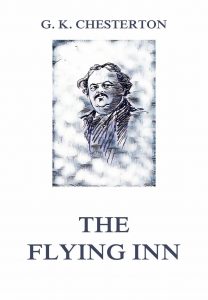The Flying Inn – Gilbert Keith Chesterton
The Flying Inn may be briefly characterised as a narrative comic opera. It follows the Gilbertian formula of satirising actual anomalies by carrying them out quite logically to burlesque extremes; and the resemblance is heightened by the serio-comic songs with which the characters regale one another throughout the story. Mr. Chesterton takes Prohibition for his point of attack, as it might have been Chancery or Aestheticism or the Admiralty; and his fantasy develops out of the ridiculous facts with the same methodical madness, the same wild precision of logic, which make Patience and Iolanthe and Pinafore a dithering delight. The aristocrat of the hour, becoming fanatical upon the subject of the Higher Orientalism, enacts that no alcohol shall be sold except under the sign of a licensed inn: which license is, of course, refused except to a few highly expensive establishments. But, just as the last inn of old England is about to be torn down, along comes a wild Irish captain who is a friend of the innkeeper; plucks up the sign, and away they go, taking with them a cheese and a keg of rum and a delectable bull-pup who rejoices in the name of Quoodle …

The Flying Inn
Format: Paperback
The Flying Inn.
ISBN: 9783849677794.
Available at amazon.com and other venues.
Biography of Gilbert Keith Chesterton (from Wikipedia):
Gilbert Keith Chesterton, KC*SG (29 May 1874 – 14 June 1936), better known as G. K. Chesterton, was an English writer, poet, philosopher, dramatist, journalist, orator, lay theologian, biographer, and literary and art critic. Chesterton is often referred to as the “prince of paradox”. Time magazine has observed of his writing style: “Whenever possible Chesterton made his points with popular sayings, proverbs, allegories—first carefully turning them inside out.”
Chesterton is well known for his fictional priest-detective Father Brown, and for his reasoned apologetics. Even some of those who disagree with him have recognised the wide appeal of such works as Orthodoxy and The Everlasting Man. Chesterton routinely referred to himself as an “orthodox” Christian, and came to identify this position more and more with Catholicism, eventually converting to Catholicism from High Church Anglicanism. George Bernard Shaw, his “friendly enemy”, said of him, “He was a man of colossal genius.” Biographers have identified him as a successor to such Victorian authors as Matthew Arnold, Thomas Carlyle, Cardinal John Henry Newman, and John Ruskin.
(The text of the last section was taken from a Wikipedia entry and is available under the Creative Commons Attribution-ShareAlike License.)
Publisher’s Note: This book is printed and distributed by Createspace a DBA of On-Demand Publishing LLC and is typically not available anywhere else than in stores owned and operated by Amazon or Createspace.
